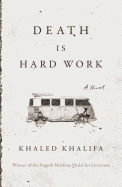
There are two main preoccupations in Death Is Hard Work, Khaled Khalifa's novel about life during the Syrian civil war: the fear of the checkpoint and the question of one's obligations to the dead and the living. When Abdel Latif dies--surprisingly, of old age rather than from a barrel bomb or a sniper's bullet--his children Bolbol, Hussein and Fatima must transport his rapidly rotting body to his home town for burial. Prior to the civil war, the trip would have been easily accomplished in a morning. Now, it will take days--days fraught with stops, interrogations, insurgencies and brutal, sudden death.
Along the journey, the siblings, whose "grudges... had heaped up like worn-out cloths in a locked wardrobe," bicker and fight and resume their childhood roles. They resist reconciliation, much like their fellow citizens who continue to kill and maim each other over the course of the book, to the point where the "inhabitants of the city regarded everyone they saw as not so much 'alive' as 'pre-dead.' It gave them a little relief from their frustration and anger."
This isn't an overly miserable or joyless tale--the pre-war flashbacks are vivid, especially the floral life tended to by the now-deceased Latif, creating a poignant contrast to the war itself. There are also slivers of humanity even during encounters with the most hardened combatants. Remembrance and hope allow both the reader and the characters to endure. --Evan M. Anderson, collection development librarian, Kirkendall Public Library, Ankeny, Iowa

